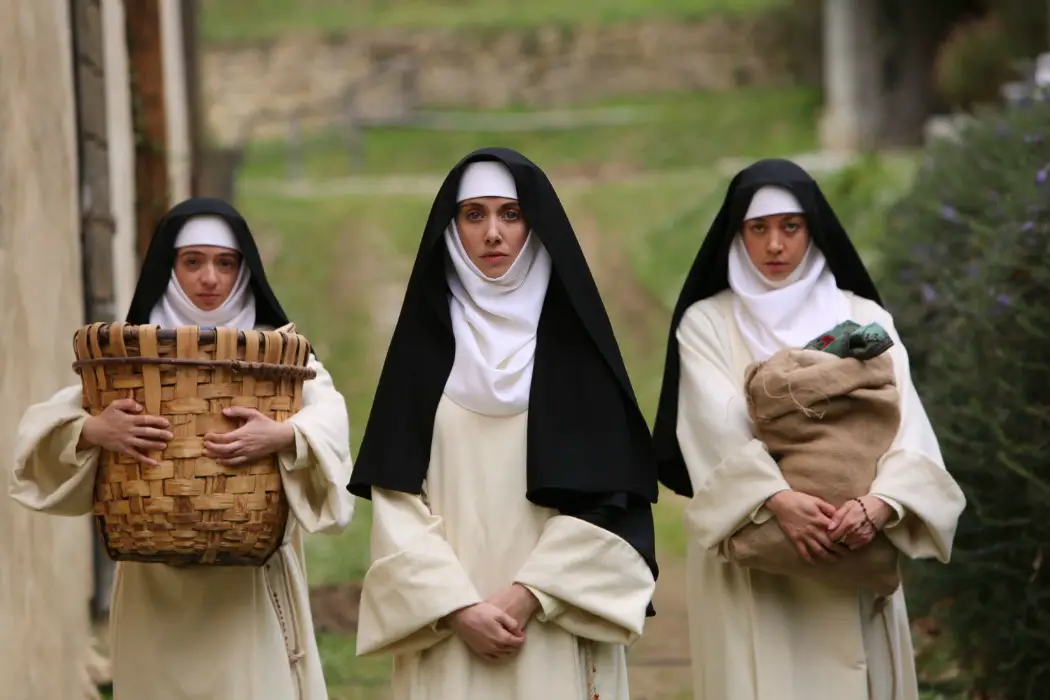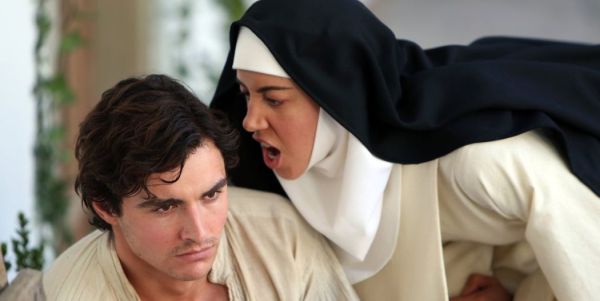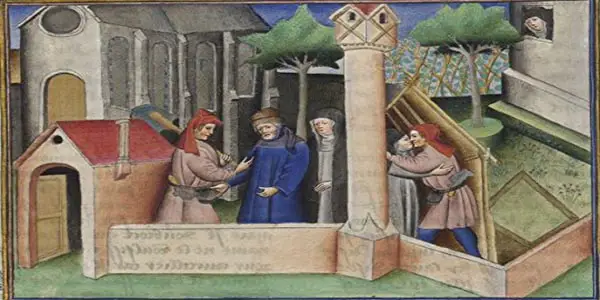THE LITTLE HOURS: A Catholic’s Persepective

Michelle Sabato is an actor and writer from Cleveland, Ohio.…
When people first meet me they tend to find out three things rather quickly: I’m Sicilian, I’m Catholic and I’m a New Kids on the Block fan. While I might not be a model for Catholic perfection, it’s still part of my culture and my identity. I also reference lines from Parks & Recreations quite often, so when I saw images of Aubrey Plaza dressed in a full habit, I was intrigued. With the release of The Little Hours, multiple Catholic groups slammed the film over its filth and poor depictions of the clergy. This further heightened my intrigue, so I caved and saw the film. Here are a couple insights that I took away from The Little Hours.
A Nun’s Tale
The film takes place in the Middle Ages in an Italian village. A young servant, Massetto, played by Dave Franco, has to flee his master’s home because he was caught sleeping with his wife. Massetto meets Father Tammasso, played by John C Reilly, in the woods and the priest agrees to take him back to the convent he runs to work on the grounds. The last person to work at the convent quit after being harassed, so Massetto agrees to pretend to be a deaf mute so that there is little interaction between him and the nuns.

When he arrives, Massetto finds himself in the midst of a cloistered convent full of unconventional nuns. The three main sisters, Alessandra, Fernanda and Ginerva, are physically and verbally abusive. And now that Massetto is in their lives, the sisters break their vows and seduce him. In essence, anything that a nun is supposed to do, these nuns do the opposite.
Historical Relevance
The film was inspired by Giovanni Boccaccio’s The Decameron, a collection of novellas published in the fourteenth century. The Decameron included stories of men and women in the Florentine countryside and is similar to other works, such as The Canterbury Tales. It is full of comedy and witty humor while using the clergy of the Catholic Church as a satirical theme.
Not all women who entered the convent did so because they were called to religious life. A good amount of women came from poverty, and their families were unable to take care of them; the church was the only way for survival. Also, if a woman could not get married off or if there was not enough money for a dowry, she might go into the convent until her family could raise enough money. This is the case for Sister Alessandra, played by Alison Brie.

She had no intention of being a life long virgin married to the church, but she had to take on this role for survival. With that, it is easy to understand why a nun would “act out”, especially if this was not a life she was truly intended for. Many nuns became pregnant during the middle ages (and some still do). There are countless tales of priests and nuns falling in love and leaving the church to get married. What is shown in The Little Hours might be exaggerated but it’s not without certain truths.
Viewing As A Catholic
When I say “I’m Catholic”, I am more than aware of the stereotypes that might arise in someone’s mind. But I firmly believe in artistic expression and the right of anyone to create, even if it’s offensive to some. I sat in the movie theatre to watch The Little Hours expecting to be offended to some degree. And that was only based on some of the words that I heard from multiple Catholic groups reviewing the film. I laughed multiple times through the film, but I was never offended. In fact, there was a scene that hit a little too close to home. Sister Ginerva, played by Kate Micucci, is giving her confession.
She states that she stole and ate a turnip. Moments later, Sister Fernanda, played by Aubrey Plaza, goes into confession and repeats the same exact story. She overheard Ginerva and stole the confession because she didn’t have anything else to confess. This is something that happened countless times at Catholic school. I cracked up laughing remembering a time where a young boy in my class got so nervous about going to confession that he opened the Bible, looked down at the Ten Commandments and went into the confessional booth to tell the priest he committed adultery. We all got in trouble after that for not taking the ritual seriously.
There was nothing in the film that challenged my faith or mocked my beliefs. Was it a little uncomfortable to see a woman in a nun’s habit have sex? Yes. But did it offend me? No.
The Little Hours: Conclusion
The Little Hours was an edgy and humorous take on religious life in the Middle Ages. Many of the laughs came from the over-the-top nature of the story, but the cast of comedians cannot be discredited from bringing their A game to this film. While the subject matter appears to be controversial on paper, the finished product falls short of inducing genuine upset.
Should a film of this nature upset you? What makes a film push the envelope too far?
The Little Hours was released in US cinemas on June 30th.
Does content like this matter to you?
Become a Member and support film journalism. Unlock access to all of Film Inquiry`s great articles. Join a community of like-minded readers who are passionate about cinema - get access to our private members Network, give back to independent filmmakers, and more.
Michelle Sabato is an actor and writer from Cleveland, Ohio. By the age of 2 Michelle had memorized all the words to The Wizard of Oz. So, yes, she can carry a conversation with just using movie quotes.













